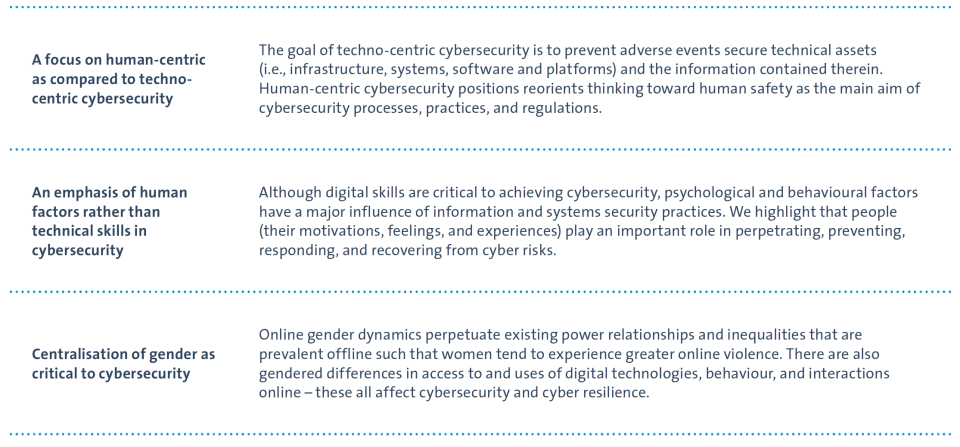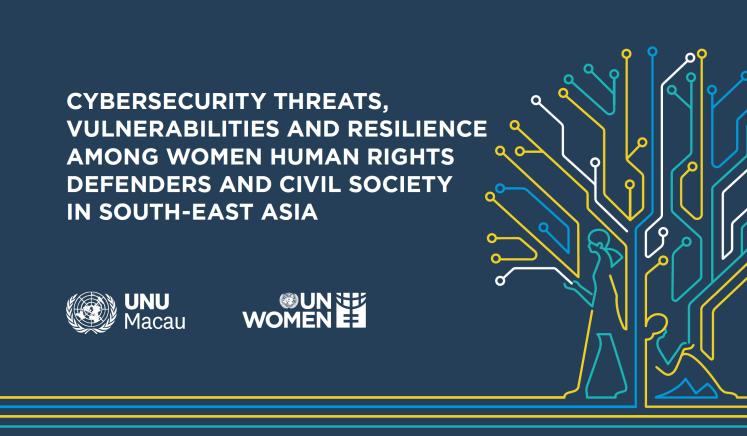- This research report aims to generate knowledge on the cybersecurity posture of Women Civil Society Organizations (WCSOs) and Women Human Rights Defenders (WHRDs) in South- East Asia, with the goal of promoting cyber resilience and supporting the rights of women in all their diversity in the region and beyond.
- The research takes a gendered lens and human-centric approach to understanding cybersecurity in South-East Asia, differing substantially from previous traditional conceptualisations of cybersecurity.
- The research highlights that WCSOs and WHRDs rely on digital tools to drive their missions, but this digital dependence comes with significant cybersecurity risks, including exposure to cyber threats and increased cyber vulnerabilities.
- The report recommends that there is a need for a shift from techno-centric and generic approaches to cybersecurity and to support contextualized, human-centered approaches that promote cyber resilience and centralize gender.
The Women, Peace, and Security (WPS) agenda recognizes that women are often excluded from security processes and encourages their leadership and meaningful participation in peace efforts across all spheres of public and private life. In an increasingly digitally interconnected world WHRDs and WCSOs are at the forefront of this agenda, leveraging digital tools to advance their missions and engage in support, advocacy, and activism for women and girls. However, increased digital connection exposes these groups to significant cybersecurity risks.
In this latest research report, UN Women and UNU Macau take a gendered lens and human-centric approach to understanding cybersecurity in South-East Asia. This approach is distinct from traditional conceptualizations of cybersecurity in three critical ways:

Key findings include:
1. WCSOs and WHRDs rely on digital technologies for their work
For WCSOs and WHRDs, digital technologies are indispensable. These tools (especially social media) enable them to connect with beneficiaries, raise awareness about women’s rights, and mobilize support for their causes. The majority of WCSOs (89%) reported that digital technologies are vital to their work, but they also rely on personal devices to conduct their work—often due to limited access to organizational resources—which exposes them to heightened cybersecurity risks.
2. The Cyber Threat Landscape for WCSOs and WHRDs differs from other actors
WCSOs and WHRDs in South-East Asia are at high risk of experiencing a range of cyber threats. WCSOs had higher threat perceptions and threat experiences compared to general CSOs - the largest differences being for online harassment, trolling, and doxing. These threats are frequently gendered, targeting WHRDs and WCSOs with misogynistic and sexualized harassment due to the nature of their work. Despite being aware of these risks, many are not adequately prepared to defend against or recover from cyberattacks.
3. Cyber Vulnerabilities of WCSOs and WHRDs
Even though many WCSOs and WHRDs exhibit high levels of digital self-efficacy, they remain vulnerable. Key vulnerabilities include inadequate protection for personal devices, use of unlicensed software, and lack of comprehensive organizational cybersecurity policies. Risky behaviors, such as posting work-related content on social media and downloading potentially unsafe files, further exacerbate these vulnerabilities.
The findings from this research underscore the essential role of digital technologies for WCSOs and WHRDs and the unique cybersecurity challenges they face. To safeguard these women’s voices in peace and security, there is a pressing need for human-centric and gender-sensitive approaches to cybersecurity.
Key recommendations include:
1. Increase knowledge and awareness of gendered cybersecurity threats and vulnerabilities among civil society, governments, private-sector actors and other decision-makers. This includes:
- Engaging in awareness campaigns to highlight the impact of cyberattacks on women’s civic engagement and peace efforts.
- Documenting and sharing the lived experiences of WCSOs and WHRDs facing gendered cybersecurity threats.
- Conducting targeted research to understand the specific cybersecurity challenges in conflict and crisis-affected areas.
2. Foster inclusive and collaborative approaches in cybersecurity policy development and engagement. This involves:
- Advancing dialogues among various stakeholders, including civil society, governments, academia, and private-sector actors.
- Providing targeted support to WCSOs and WHRDs to lead and participate in negotiations and decision-making processes relating to cybersecurity-related laws and policies at all levels.
- Basing the development and implementation of cybersecurity-related laws, policies and practices on international best practices and clauses outlined in international law , human rights conventions and WPS commitments.
- Conducting intersectional human rights impact assessments as part of cybersecurity-related law and policy development processes.
3. Build knowledge and strengthen capacities of civil society, government, private-sector actors and other decision makers to develop appropriate means of prevention and response to cyberattacks and their disproportionate impacts on WCSOs and WHRDs. This includes:
- Co-creating contextualized resources, such as guidelines and toolkits, to prevent, respond to and recover from cyber threats and mitigate cyber vulnerabilities.
- Providing targeted, accessible, and inclusive capacity-building activities and training.
- Offering needs-based, inclusive, and gender-responsive cybersecurity support to WCSOs and WHRDs.
- Establishing platforms and mechanisms to monitor and report cyberattacks, ensuring the privacy and security of the information collected.
Suggested Citation: Stuart, Jaimee. (2024). Cybersecurity threats, vulnerabilities and resilience among women human rights defenders and civil society in South-East Asia. UN Women Regional Office of Asia and the Pacific and United Nations University Macau. Bangkok, Thailand and Macau (SAR), China. https://doi.org/10.17605/OSF.IO/H38WZ



